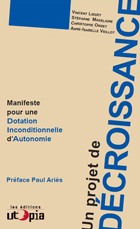 In order to move beyond a productivist vision of life, we have to question the notion of work itself, which, for the most part, serves to sustain a system of profound inequality. We need to break from “sacrosanct economic growth”, “abandoning work-based ways of thinking, putting the economy and our obsession with the bottom line back where they belong, rejecting the view that everything revolves around work!”
In order to move beyond a productivist vision of life, we have to question the notion of work itself, which, for the most part, serves to sustain a system of profound inequality. We need to break from “sacrosanct economic growth”, “abandoning work-based ways of thinking, putting the economy and our obsession with the bottom line back where they belong, rejecting the view that everything revolves around work!”
 Not a day goes by without someone vilifying the unemployed, labeling them “charity cases”, “profiteers”, or “those damned jobless people” who “have no interest in getting a job”! They must be kept in check. We must watch their every move.
Not a day goes by without someone vilifying the unemployed, labeling them “charity cases”, “profiteers”, or “those damned jobless people” who “have no interest in getting a job”! They must be kept in check. We must watch their every move.
Above all, they too have to do their part in getting the economy back up and running in the great productive endeavor – even if that means jeopardizing their own lives – producing more and more, keeping the mighty machine running while jump-starting sacrosanct economic growth. “Green” growth, if possible. All to further enrich the oligarchy!!
OK then, let’s get to work: but doing what?
What, in fact, is the meaning of our work? What exactly are we producing? And for what purpose?
Many jobs already serve a destructive system, and are therefore themselves damaging, toxic. This includes, in particular: all jobs related to the military-industrial complex (160,000 jobs and grossing 18.6 billion dollars annually in France alone); jobs in advertising, a sector that serves as a mechanism to occupy our imaginations, alienating and dumbing us down as it constantly creates new needs and desires that wind up only in frustration, while squandering the creativity and talents of our fellow citizens (150,000 jobs and 37 billion in annual sales); lobbyists (amounting, for example, to tens of thousands of jobs in Brussels); jobs related to planned obsolescence and packaging; and, lest we forget, all the jobs involved in finance, banking, insurance, new technologies (extremely energy greedy), transportation (especially trucks and airplanes, which are the worst polluters) and on and on…

In fact, the more we think about it, the list just keeps on growing. OK, just one more example: all the “bullshit jobs” that could be eliminated if we were to simplify our bureaucratic systems of surveillance!
It all adds up to millions of jobs, hundreds of millions of lost hours… and, in the end, in malaise, the malaise of being forced to work, regardless of the end result.
“Yes, but at least they have jobs, unlike those on welfare!”
“And all work should be compensated – we are, after all, homo economicus!” “Those who work help boost lifesaving GDP.” Well, actually, no, it is not so simple: a lot of business conducted in society takes place outside the marketplace.
Our economico-maniacal way of looking at things prevents us from seeing this other reality: that housework, volunteering, leisure activities, the sharing economy – everything, in fact, that has real meaning – provides well-being free-of-charge, outside the scope of bean counters’ ghastly calculations. This includes love, friendship, solidarity, conviviality… the very foundations of a society of Buen Vivir.
Working less to live more
These are the issues that inspire us, all facets of the movement known by the provocative name of Degrowth. There are many myths to be dispelled: working for work’s sake, productivism, economicism, competition and discontent foisted by the media on the so-called “welfare cases”, while they turn a blind eye to tax evasion (tens of billions every year in France!) and the most blatant examples of inequality.
Should we not instead call out “the wealthy bastards” with one voice – that of the majority – rather than find ourselves divided? It is so much easier to wear the crown: it seems good times still lie ahead for the oligarchy.
Degrowth means stepping aside for a moment to call into question what we produce, how we produce things, how useful they are, and how what we produce is used.

As we look at the list above, we may come to realize that it is possible to work less while producing less useless garbage, producing locally and sustainably articles that can be repaired, while at the same time sharing, cooperating, living together rather than each of us in an individual bubble in competition with one another.
Of course our goal is not to make people feel guilty, let alone point a judgmental finger at one another since these jobs are forced upon us by the economy. We are caught up in a system: work, borrow, consume, obey, work! Our goal instead is to open debate over the meaning of the activities we engage in. And to figure out how to regain control of them.
Small is beautiful
Another objective of Degrowth is to ponder what a sustainable, frugal society of plenty would look like. It would be a low-tech society, one of shared manual labor, but above all one designed to reduce the burden of work as much as possible. Such an experiment is already underway with respect to new techniques of producing healthy, local food sustainably such as permaculture, agro-ecology and agro-forestry.
Degrowth also has its eye on transitions: how can we escape the impasse of a growth-based society? How can we detoxify ourselves from all of our technological addictions, as well as our energy enslavement, step by step, calmly and democratically?
The transition is underway, and by building on these options, we are already testing out what tomorrow’s “un-growth” societies might look like.
 But we cannot stop there, which is why, in the booklet “A Degrowth Project” we offer suggestions for further reflection and debate with respect to the economic and social tools that might help us break free from “work for work’s sake” so as to create societies which allow us to freely choose the activities we engage in.
But we cannot stop there, which is why, in the booklet “A Degrowth Project” we offer suggestions for further reflection and debate with respect to the economic and social tools that might help us break free from “work for work’s sake” so as to create societies which allow us to freely choose the activities we engage in.
The urgency of slowing down
First, we believe that we should all work together in order to work less. We could establish decentralized measures making it possible to choose to work less. For example: the guaranteed right to be able to work part-time and take sabbaticals; the creation of a platform for exchanging ideas, for sharing projects and work schedules, etc. Fewer “bullshit jobs” and more meaningful activities, allowing more and more people to participate in this beautiful transition – one that is already underway – and reclaim individual freedom!
As part of this transition, we might consider a series of laws aimed at re-localizing what we produce and sanctioning the undesirable: a drastic cut in military budgets; fines on planned obsolescence; strict control of advertising; progressive taxes on packaging materials, unnecessary transportation and gadgets with, of course, programs to help foster change and to aid in the transition.
Finally, there is another interesting avenue: establishing an adequate base income in order to break the bond between economic survival and the obligation to work. A first step might be replacing dysfunctional unemployment benefits (such as France’s Revenu de solidarité active or RSA) – which do not work anyway and which vilify so-called “welfare cases” – with an individual base income, both universal and unconditional. This income would be established along with the progressive introduction of a maximum allowable income, allowing us to break free from the “religion of the economy” by reestablishing democratic control over central banks and the printing of money, and by opening debate over whether or not illegitimate public debt should be paid off.
Similarly, by leveraging the expansion of these freely-provided, tangible alternatives, we might consider demonetizing basic income step by step in order to move toward what is known as the Unconditional Autonomy Allowance.
Measures like these not only require political courage, but also that we break free from our work-centered ways of thinking to embrace a broader vision of the world, putting the economy and the bean counter’s vision of life back where they belong, shaking off the notion that everything revolves around work!
Here’s to the end of work! It is time to once again find joy in what we do, engaging both our minds and our hands, and with free time to use as we see fit.
Vincent Liegey, in Reporterre, on the 21rst of October 2014
Translated into English by Dan Golembeski.




Ping : A Degrowth Project: « And What If We...